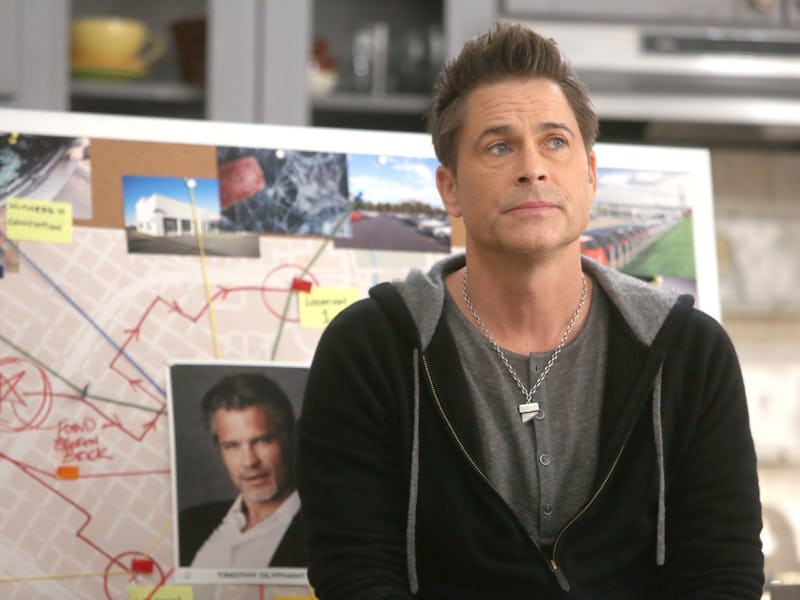'The Grinder' Needs to Be Renewed So It Can Save Us From TV
Rob Lowe's Fox comedy takes the piss out of TV's self-seriousness

The Grinder, the brilliant freshman comedy that takes the piss out of self-serious television and audiences’ slavish devotion to fiction, is in danger of not being renewed. And in a twist of cruel irony, its cancellation would be a serious loss.
The creative renaissance of television turned the idiot box into the prime artistic medium of its time, with great auteurs flocking to the flush budgets and freedom afforded by cable networks and streaming outlets. Critics take television as seriously as they do film, characters become magazine cover icons, and plot twists can spark national outrage. Pre-written words recited by actors in costumes are treated as actual occurrences, and performers are asked questions about real-world events when their expertise is in playing pretend, not world events or the law. The Grinder stomps all over this new, dim reality, kicking TV audiences in the shins while distracting them with one-liners.
Rob Lowe stars as Dean Sanderson, a dumb-but-earnest actor who, after a decade playing a dashing attorney in a ridiculous hit legal drama, returns home to Idaho to live with his brother Stewart. As played Fred Savage, Stewart is everything Dean is not: quiet, pragmatic, and intelligent. His law firm handles local cases, and he makes a good living doing ho-hum work such as representing clients in business contracts and traffic court. When Dean comes to live with him, he decides that his time on TV has qualified him to actually practice law, a preposterous notion that immediately throws the firm of Sanderson & Yao into chaos.
Beyond the awkward position of having to manage his sensitive brother’s gigantic Hollywood ego, Stewart has to deal with the fact that an improbably high number of people actually believe that Dean — who played a character called The Grinder on a show called The Grinder in this fictional universe — is actually a lawyer, and knows what he’s doing. He’s brash and dramatic and spouts nonsense cliches like his catchphrase, “But what if it wasn’t?” but has absolutely no clue how to practice the law.
During his time as a delusional, unsanctioned attorney, Dean had plenty of people — his lawyer father, rival firms, witnesses — convinced that he could actually be a lawyer (though he often screws up in court when it comes down to business). His misplaced self-confidence is reinforced at the beginning of each episode of The Grinder, which features a preposterous clip from the soapy fictional show The Grinder, followed by Dean’s even-dumber explanation for the ludicrous climax. His dad and niece and nephew eat it up, engrossed in his story and totally buying into the deep moral explanations he gives for his fictional actions.
It’s hard not to think that the show’s creators, Jarrad Paul and Andrew Mogel, don’t intend to needle an American public that has become so obsessed with TV that character deaths and shaky plot lines often cause more outrage than real world events. TV is, ultimately, all a silly game, played by people wearing borrowed clothes on elaborately decorated sets in big hollow buildings. By placing the show in Idaho — about as far from Hollywood as you can get in America, culture-wise — they juxtapose Dean’s artificial world with the very normal suburban existence that his family lives.
As the season has gone on, Dean has tried to adjust to his new life and the creeping reality that he has no idea what the hell he’s doing. A spinoff of the fictional, show-within-the-show Grinder, starring Timothy Olymphant, is a constant thorn in his side and pain to his ego, but through therapy and a ceremonial torching of his Grinder memorabilia, he begins to find a new normal. But a late-season plot twist now sees Stewart needing Dean to return to his old Grinder ways, which just goes to show that we all need the comfort of having our fictional heroes around, to invest in their outrageous sense of self-importance and keen dramatic timing. Even if they’re idiots, and being so involved in their alternate reality is a distraction from the mounting problems that threaten to destroy the real world.